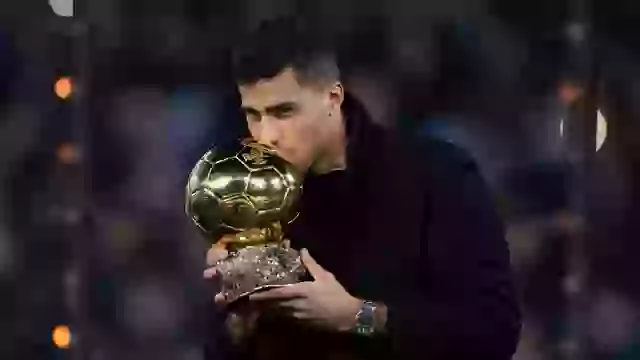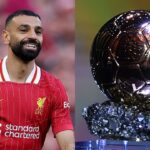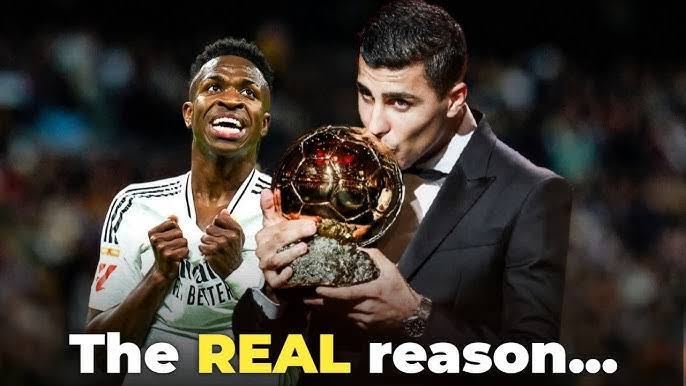Rodri snubs Man City teammates when naming his two picks for 2025 Ballon d’Or winner

As the footballing world eagerly anticipates the September 2025 Ballon d’Or ceremony at the Theatre du Chatelet in Paris, the debate surrounding who will claim football’s most coveted individual award has reached fever pitch. With legendary players, current stars, and emerging talents all weighing in with their predictions, the 2025 edition promises to be one of the most competitive and unpredictable in recent memory.
The Current Landscape of Contenders
The 2025 Ballon d’Or race presents a fascinating blend of established superstars and emerging talents, each bringing compelling cases for why they deserve football’s highest individual honor. Unlike previous years dominated by household names like Lionel Messi and Cristiano Ronaldo, this year’s competition reflects the sport’s evolving landscape, where young prodigies are challenging traditional hierarchies and redefining what it means to be the world’s best player.
The Spanish Sensation: Lamine Yamal
At just 17 years old, Lamine Yamal has emerged as one of the most compelling candidates for the 2025 Ballon d’Or. The Barcelona winger’s meteoric rise has been nothing short of extraordinary, combining raw talent with a maturity that belies his tender age. His 18-goal tally across all competitions last season, while impressive in isolation, tells only part of the story of his impact on both club and international football.
Yamal’s starring role in Spain’s Euro 2024 triumph cannot be overstated. At an age when most players are still developing their craft in youth academies, Yamal was pulling the strings for La Roja on the biggest stage in European football. His performances throughout the tournament showcased not only his technical ability but also his mental fortitude and capacity to perform under pressure – qualities that traditionally separate good players from great ones.
The young winger’s playing style represents a modern interpretation of the classic Spanish football philosophy. His ability to drift between positions, create chances for teammates, and score crucial goals has made him indispensable to both Barcelona and the Spanish national team. What sets Yamal apart from other young talents is his consistency and his ability to influence games at the highest level, whether in La Liga, the Champions League, or international competition.
The Veteran Excellence: Pedri’s Understated Brilliance
While Yamal captures headlines with his age-defying performances, his compatriot Pedri represents a different kind of excellence. At 22, Pedri has already established himself as one of the world’s premier midfielders, combining technical sophistication with tactical intelligence that coaches dream of instilling in their players.
Pedri’s 2024-25 campaign with Barcelona was nothing short of stellar, playing a pivotal role in the club’s La Liga triumph. His ability to control the tempo of games, create opportunities for teammates, and maintain possession under pressure has made him the heartbeat of both Barcelona and Spain’s midfield. Despite missing the second half of Euro 2024 through injury, his contributions to Spain’s early tournament success and his consistent club performances throughout the season have not gone unnoticed by his peers and pundits alike.
The midfielder’s playing style embodies the evolution of the modern playmaker. Unlike traditional number 10s who operated in fixed positions, Pedri’s mobility and adaptability allow him to influence games from various areas of the pitch. His vision, passing range, and ability to arrive in the box at crucial moments make him a complete midfielder who contributes to all phases of play.
PSG’s Dynamic Duo: Dembélé and Vitinha
Paris Saint-Germain’s remarkable 2024-25 campaign, culminating in Champions League glory, has thrust two of their key players into Ballon d’Or contention. Ousmane Dembélé and Vitinha represent different facets of modern football excellence, yet both have been instrumental in PSG’s success on multiple fronts.
Dembélé’s renaissance in Paris has been remarkable to witness. After years of injury struggles and inconsistency, the French winger has found his form at the perfect time. His 32 goals across all competitions in 2024-25 represent a career-high tally, but more importantly, they have come in crucial moments for club and country. The bookmakers’ current 2/5 favorite for the award, Dembélé’s combination of pace, skill, and end product has made him one of Europe’s most dangerous attackers.
What makes Dembélé’s case particularly compelling is the timing of his peak performances. His goals and assists have not only helped PSG secure domestic titles but were crucial in their Champions League triumph – a competition that has historically held significant weight in Ballon d’Or voting. His ability to perform in the biggest games against the strongest opposition demonstrates the kind of mentality that Ballon d’Or winners typically possess.
Vitinha, meanwhile, represents the modern box-to-box midfielder’s evolution. The Portuguese international’s ability to contribute defensively while also providing creativity and goals from midfield has made him one of PSG’s most valuable players. His performances throughout PSG’s trophy-laden season have caught the attention of former players like Luis Figo, who specifically mentioned him as a dark horse candidate for the award.
The Established Stars: Salah and Mbappe
No Ballon d’Or discussion would be complete without considering established superstars who continue to perform at the highest level. Mohamed Salah’s 47 goal contributions (29 goals and 18 assists) for Liverpool represent another season of consistent excellence from the Egyptian forward. His longevity at the top level and continued ability to influence games makes him a perennial candidate for individual honors.
Kylian Mbappe’s first season at Real Madrid has been a study in adaptation and growth. Despite initial struggles adjusting to his new environment, the French forward’s 31-goal haul in La Liga earned him the European Golden Shoe for the first time in his career. However, as Luis Figo noted, Mbappe’s lack of major team titles this season might impact his chances, highlighting how collective success often influences individual recognition in modern football.
Expert Opinions and Predictions
The beauty of the Ballon d’Or debate lies in its subjectivity, and this year’s race has produced fascinating insights from some of football’s most respected figures. Each expert brings their own perspective on what constitutes excellence and how different criteria should be weighted in determining the world’s best player.
Rodri’s Spanish Bias
As the defending Ballon d’Or winner, Rodri’s opinion carries particular weight in this discussion. His decision to back fellow Spaniards Pedri and Yamal while notably excluding his Manchester City teammates reveals interesting insights about how players view excellence. Rodri’s comment about Pedri being “unbelievable” and his acknowledgment of Yamal’s talents suggests that nationality and playing style compatibility might influence how players perceive their peers’ abilities.
Rodri’s perspective is particularly valuable because he understands the pressures and expectations that come with winning the award. His recognition of Spanish players might also reflect his understanding of the tactical sophistication and technical ability that Spanish football has consistently produced. The fact that he prioritizes creativity and technical ability over raw statistics suggests that different players value different aspects of the game when assessing excellence.
Luis Figo’s Balanced Approach
Former Ballon d’Or winner Luis Figo’s analysis provides a more comprehensive view of the candidates. His recognition of multiple players – Yamal, Dembélé, and Vitinha – demonstrates an appreciation for different playing styles and contributions. Figo’s emphasis on both individual performance and team achievements reflects the complex nature of modern Ballon d’Or voting, where voters must balance personal statistics with collective success.
Figo’s specific mention of Vitinha as a potential dark horse candidate is particularly intriguing. His suggestion that the Portuguese midfielder “has won everything this season” highlights how team success can elevate individual profiles. This perspective aligns with traditional Ballon d’Or voting patterns, where players from successful teams often have advantages over those with superior individual statistics but fewer trophies.
Cristiano Ronaldo’s Pragmatic View
Cristiano Ronaldo’s comments about the award losing “consensus” and his acknowledgment that he doesn’t “believe much in individual awards” because he knows “what goes on behind the scenes” provide a fascinating insight into how one of football’s greatest players views these honors. His suggestion that Champions League winners should have preference aligns with historical voting patterns while also reflecting his own experiences with the award.
Ronaldo’s mention of Yamal, Dembélé, and Vitinha as potential winners shows his recognition of the current generation’s talent while also demonstrating his understanding of how media narratives and timing can influence voting. His pragmatic approach to individual awards reflects the wisdom that comes from decades at the highest level of the sport.
The Evolving Criteria for Excellence
The 2025 Ballon d’Or race reflects broader changes in how football excellence is measured and recognized. Traditional metrics like goals and assists remain important, but voters increasingly consider factors like tactical impact, leadership qualities, and contributions to team success in major competitions.
The Youth Factor
The prominence of young players like Yamal in this year’s discussion represents a significant shift in football’s landscape. Historically, the Ballon d’Or has favored players in their mid-to-late twenties who had accumulated both individual statistics and team honors over several seasons. The serious consideration of a 17-year-old for the award suggests that exceptional talent and impact can transcend age-based expectations.
This shift might reflect football’s increasing pace of development, where young players are exposed to high-level coaching and competition earlier than previous generations. The global nature of modern football also means that exceptional talents are identified and developed more quickly, allowing them to make meaningful contributions to elite teams at younger ages.
Team Success vs Individual Brilliance
The 2025 race perfectly encapsulates the ongoing debate about whether individual awards should prioritize personal statistics or team achievements. PSG’s Champions League triumph gives Dembélé and Vitinha significant advantages, while Barcelona’s La Liga success boosts Pedri and Yamal’s credentials. Meanwhile, players like Salah, despite impressive individual numbers, might suffer from their team’s relative lack of major trophies.
This dynamic reflects the collaborative nature of modern football, where individual brilliance must be channeled through team systems to achieve the highest honors. The most successful Ballon d’Or candidates typically combine exceptional personal performance with meaningful contributions to team success, creating a symbiotic relationship between individual and collective achievement.
The Role of International Competition
The impact of Euro 2024 on this year’s Ballon d’Or race cannot be understated. Spain’s success in the tournament has elevated their key players’ profiles, while the tournament’s timing – occurring within the voting period – ensures that these performances remain fresh in voters’ memories.
International tournaments have historically played crucial roles in Ballon d’Or voting, often serving as tie-breakers between closely matched candidates. The visibility and pressure associated with representing one’s country on the biggest stages provide additional context for evaluating player performance and mental fortitude.
Yamal’s emergence as a key player for Spain during Euro 2024, despite his youth, demonstrates the kind of big-game temperament that voters traditionally reward. Similarly, Pedri’s injury-enforced absence from the latter stages of the tournament might impact his chances, highlighting how timing and availability can influence individual award races.
The Global Perspective
The 2025 Ballon d’Or race reflects football’s truly global nature, with candidates representing different continents, playing styles, and football philosophies. From Salah’s African representation to the European talents dominating the conversation, this year’s race showcases the sport’s diversity and the various paths to excellence.
The international voting system for the Ballon d’Or means that different regional preferences and football cultures influence the final outcome. Voters from different countries might prioritize different aspects of player performance, creating a complex dynamic where candidates must appeal to diverse perspectives and preferences.
Looking Ahead to September
As the September ceremony approaches, several factors will likely influence the final outcome. The timing of the vote means that any standout performances in the early part of the 2025-26 season could sway undecided voters. Similarly, the way candidates handle pressure and expectation in the lead-up to the ceremony might influence perceptions about their readiness for such recognition.
The media narratives surrounding each candidate will also play crucial roles. Yamal’s youth and potential represent an exciting story of emergence, while Dembélé’s redemption arc after years of injury struggles provides a compelling narrative of perseverance. Pedri’s consistent excellence and Vitinha’s under-the-radar brilliance offer different but equally valid cases for recognition.
The Broader Impact on Football
Regardless of who ultimately wins the 2025 Ballon d’Or, this year’s race represents important themes in modern football. The prominence of young talents like Yamal signals a changing of the guard, while the recognition of different playing styles and positions reflects football’s tactical evolution.
The international nature of the discussion, with experts from different countries and backgrounds weighing in, demonstrates football’s power to unite diverse perspectives around shared appreciation for excellence. The debate itself becomes part of football’s cultural fabric, creating conversations that extend far beyond the ceremony itself.
Conclusion
The 2025 Ballon d’Or race stands as one of the most open and intriguing in recent memory. With compelling candidates representing different ages, nationalities, and playing styles, the eventual winner will emerge from a field of genuinely exceptional talents. Whether voters ultimately favor the explosive emergence of Yamal, the consistent excellence of Pedri, the goal-scoring prowess of Dembélé, the all-around brilliance of Vitinha, or the sustained performance of established stars like Salah and Mbappe, the decision will reflect the complex criteria that define modern football excellence.
What remains certain is that football continues to evolve, producing new stars while celebrating established excellence. The 2025 Ballon d’Or ceremony will not only crown an individual winner but will also provide a snapshot of football’s current landscape, highlighting the diverse paths to greatness in the world’s most popular sport. As September approaches, the anticipation continues to build, promising a celebration of football excellence that will be remembered long after the winner is announced.















